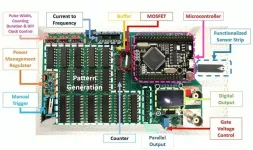(Press-News.org) In a study involving nearly 1,000 patients seen at the Baltimore Convention Center Field Hospital (BCCFH) during a five-month period in 2022 — researchers at Johns Hopkins Medicine, the University of Maryland School of Medicine and five other collaborators report that a rapid antigen test (RAT) for detecting SARS-CoV-2, the virus that causes COVID-19, can be used at home with accuracy comparable to the same test being administered by a health care professional.
The study was first posted online Feb. 13, 2024, in the American Society for Microbiology journal Microbiology Spectrum.
The researchers say their findings show that self-administered RATs rivaled the clinician-administered tests in both sensitivity (the ability, according to the National Institutes of Health (NIH), to provide a positive result for a person infected with SARS-CoV-2) and specificity (the ability, also according to NIH, to yield a negative result for a person not infected with the virus).
They added that both the self-administered and clinician-administered rapid tests evaluated in the study were comparable to the sensitivity and specificity of the established standard test for COVID-19 — the polymerase chain reaction (PCR) assay.
“We found the results between the self- and clinician-administered rapid tests were statistically similar in sensitivity — 83.9% to 88.2%, respectively — and specificity — 99.8% to 99.6%, respectively,” says study senior author Zishan Siddiqui, M.D., assistant professor of medicine at the Johns Hopkins University School of Medicine. “We believe this is an important finding because it suggests physicians can feel confident prescribing treatment based on patient-reported, self-administered tests with positive results.”
The first step for both the PCR and rapid antigen tests is obtaining a sample from a patient, either by nasal swab or collected saliva. The difference lies in how the sample is processed and analyzed. A PCR test takes a tiny bit of SARS-CoV-2 genetic material from a sample and reproduces it thousands of times so it can be more easily detected.
A rapid antigen test uses laboratory-produced antibodies to seek out and latch onto proteins on the surface of SARS-CoV-2 particles in the sample. The PCR test requires a skilled laboratory technician, special equipment and up to an hour or more to process. Testing on a massive scale can only be conducted at a large, centralized testing facility, such as a hospital laboratory.
On the other hand, rapid antigen testing uses a premade kit with a reagent that contains antibodies specific for SARS-CoV-2. The test can be conducted by anyone, administered anywhere and provides results in approximately 15 minutes.
For their study, the researchers enrolled 953 adult patients being seen at the BCCFH during the period of Feb. 12 to July 15, 2022. The study group was 60.6% female, 58.6% white, and 98.2% English-speaking. The median age was 34.
Participants reporting at least one COVID-19 symptom were categorized as symptomatic, while those reporting no symptoms were marked asymptomatic. Attending staff conducted both rapid antigen and PCR tests on the participants, and then had them independently perform a RAT. The patients were asked to report their own results, which the researchers re-read and assessed.
In an earlier study at the BCCFH, the researchers showed that RATs could be broadly, quickly and effectively applied to a large community such as Baltimore.
“What we determined from our previous work was that while the PCR test may be a better test from a clinical perspective — as it’s basically 100% accurate at detecting SARS-CoV-2 — the rapid antigen test provided significant advantages from a public health standpoint because of its ease of use, and the fact that it proved to have sufficient accuracy, specificity and reliability for detecting the coronavirus in a high-volume setting,” says study lead author Mary Jane Vaeth, a clinical assistant at the field hospital, which is now closed.
“The first study suggested that a health care system can provide an equitable response to COVID-19, with RATs making it possible to test all socioeconomic levels of a large population quickly and repeatedly,” says Siddiqui. “The new study bolsters that belief by showing comparable accuracy between self- and physician-performed RATs and, therefore, helping build clinician confidence in patient-reported results from at-home tests.”
“Despite the robust findings of our latest study, there were some limitations,” says Vaeth. “The main one, of course, was the fact that we evaluated the self- and clinician-administered accuracy of only one brand of RAT, and therefore, future studies should look at an array of brands across a broader demographic spectrum so that our results can hopefully be confirmed and amplified.”
Along with Siddiqui and Vaeth, the members of the study team from Johns Hopkins Medicine are Ishaan Gupta, Melinda Kantsiper, Charles Locke, Yukari Manabe, Henry Mitchtalik, Sophia Purekal, Resham Rahat and Matthew Robinson. Study co-authors from other institutions are Charles Callahan (BCCFH co-director), James Campbell, Minahil Cheema, E. Adrianne Hammershaimb and J. Kristie Johnson from the University of Maryland School of Medicine; Maisha Foyez, Asia Mitchell and Sarah Omer from the BCCFH; Maryam Elhabashy and Lucy Wilson from the University of Maryland Baltimore County; Aamna Cheema from the University of Maryland College Park; Kristie Sun from the Case Western Reserve University School of Medicine; Binish Javed from the Atal Bihari Vajpayee Institute of Medical Sciences and Dr. Ram Manohar Lohia Hospital; and the CONQUER COVID Consortium.
The rapid antigen test used in this study is the BinaxNOW COVID-19 test manufactured by Abbott and supplied at no cost by the Maryland Department of Health.
No funding support was received for this study.
Manabe receives salary support from National Institutes of Health grants U54EB007958, A1272201400007C and 3U54HL143541.The other study authors do not have financial or conflict of interest disclosures.
END
Johns Hopkins Medicine-led study shows rapid COVID-19 tests done at home are reliable
2024-02-13
ELSE PRESS RELEASES FROM THIS DATE:
Researchers learn how nectar-laden honey bees avoid overheating
2024-02-13
Honey bees carrying nectar have the remarkable ability to adjust their flight behavior to avoid overheating when air temperatures increase, according to research led by a University of Wyoming scientist.
Jordan Glass, a postdoctoral research associate in UW’s Department of Zoology and Physiology, conducted the study to determine how high air temperatures may limit the ability of honey bees to forage for nectar. His research findings appear in Proceedings of the National Academy of Sciences, one of the world’s most prestigious multidisciplinary scientific journals covering the biological, physical ...
Dr. Jeanne Lackamp to lead university hospitals’ behavioral health efforts
2024-02-13
CLEVELAND – Jeanne Lackamp, MD, DFAPA, FACLP, has been selected to serve as Chair of Department of Psychiatry, Psychiatrist in Chief for University Hospitals (UH), and Director of the UH Behavioral Health Institute.
The need for behavioral health services continues to increase locally and across the country. The population is still struggling with the effects of the pandemic, while more people report a sense of isolation and depression. An unprecedented number of Americans are dying from drug overdoses. From popular media to medical literature, calls to address behavioral health needs are on the rise.
“Behavioral health is health. It’s ...
Statewide cardiovascular consortium, hosted at Michigan Medicine, receives national award for patient safety, quality efforts
2024-02-13
ANN ARBOR, MI – A collaborative partnership dedicated to improving statewide cardiovascular care and outcomes — hosted at Michigan Medicine — received national recognition for efforts in patient safety and quality Tuesday.
The Blue Cross Blue Shield of Michigan Cardiovascular Consortium, also known as BMC2, earned the 2023 John M. Eisenberg Patient Safety and Quality Award in the local level innovation category. The honor is presented annually by The Joint Commission and the National Quality Forum (NQF).
BMC2 received the award for its significant improvements in the documentation of radiation use, a decrease in high-dose radiation ...
A new way to let AI chatbots converse all day without crashing
2024-02-13
When a human-AI conversation involves many rounds of continuous dialogue, the powerful large language machine-learning models that drive chatbots like ChatGPT sometimes start to collapse, causing the bots’ performance to rapidly deteriorate.
A team of researchers from MIT and elsewhere has pinpointed a surprising cause of this problem and developed a simple solution that enables a chatbot to maintain a nonstop conversation without crashing or slowing down.
Their method involves a tweak to the key-value cache (which is like a conversation memory) at the core of many large language models. In some methods, when this cache needs to hold ...
Better diagnosis and treatment of cryptococcosis
2024-02-13
A group of international mycology experts led by Professor Dr Oliver A. Cornely at the University of Cologne has jointly drafted a guideline for the diagnosis and treatment of cryptococcosis, which aims at improving infection management and thus the survival rate of patients. Cryptococcosis is a fungal infection of mainly the lungs that might lead to meningitis. The article ‘Global guideline for the diagnosis and management of cryptococcosis’ was published in the journal The Lancet Infectious Diseases.
Cryptococcosis, ...
Why do flies fall in love? Researchers tease out the signals behind fruit fly courtship songs
2024-02-13
Like a Valentine’s Day dinner or a box of chocolates, male fruit flies have their own rituals for wooing a potential mate.
As part of a complex courtship behavior, male flies vibrate their wings to produce a distinctive song that conveys a message to nearby females. Using internal information and cues from females and the environment, males decide moment to moment whether to sing and how.
Although scientists now know a lot about how fly movements produce songs, it was still not clear which cells and circuits in the fly’s nervous system enable the behavior.
Now, using a suite of novel tools, ...
Polar bears unlikely to adapt to longer summers
2024-02-13
PULLMAN, Wash. – More time stranded on land means greater risk of starvation for polar bears, a new study indicates.
During three summer weeks, 20 polar bears closely observed by scientists tried different strategies to maintain energy reserves, including resting, scavenging and foraging. Yet nearly all of them lost weight rapidly: on average around 1 kilogram, or 2.2 pounds, per day.
Some have speculated that polar bears might adapt to the longer ice-free seasons due to climate warming by acting like their grizzly bear relatives ...
Gastric bypass improves long-term diabetes remission, even after weight recurrence
2024-02-13
Key takeaways
Diabetes remission: Gastric bypass surgery results in high rates of Type-2 diabetes remission five years after the operation, even after patients regain a significant amount of weight.
Gastric bypass vs. sleeve gastrectomy: Patients who underwent sleeve gastrectomy and regained their weight were five times more likely to see their diabetes return than patients who had gastric bypass surgery and regained their weight.
CHICAGO (February 13, 2024): Adults who have obesity and Type 2 diabetes are much more likely to see their diabetes stay in remission if they undergo gastric ...
Would you prefer a mammogram, MRI, or saliva on a test strip?
2024-02-13
WASHINGTON, Feb. 13, 2024 — Breast cancer is on the rise, but new tools for early detection could save lives.
In Journal of Vacuum Science & Technology B, by AIP Publishing, researchers from the University of Florida and National Yang Ming Chiao Tung University in Taiwan reported successful results from a hand-held breast cancer screening device that can detect breast cancer biomarkers from a tiny sample of saliva. Their biosensor design uses common components, such as widely available glucose testing strips and ...
Satellites unveil the size and nature of the world’s coral reefs
2024-02-13
University of Queensland-led research has shown there is more coral reef area across the globe than previously thought, with detailed satellite mapping helping to conserve these vital ecosystems.
Dr Mitchell Lyons from UQ’s School of the Environment, working as part of the Allen Coral Atlas project, said scientists have now identified 348,000 square kilometres of shallow coral reefs, up to 20-30 metres deep.
“This revises up our previous estimate of shallow reefs in the world’s oceans,” Dr Lyons said.
“Importantly, the high-resolution, up-to-date mapping satellite technology also allows us to see what these habitats ...






